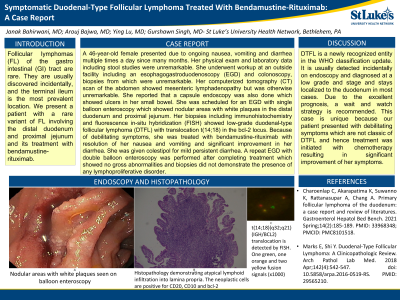Back


Poster Session A - Sunday Afternoon
Category: Small Intestine
A0647 - Symptomatic Duodenal-Type Follicular Lymphoma Treated With Bendamustine-Rituximab: A Case Report
Sunday, October 23, 2022
5:00 PM – 7:00 PM ET
Location: Crown Ballroom

Has Audio

Janak Bahirwani, MD
St. Luke's University Health Network
Bethlehem, PA
Presenting Author(s)
Janak Bahirwani, MD1, Arouj Bajwa, MD2, Ying Lu, MD1, Gurshawn Singh, MD1
1St. Luke's University Health Network, Bethlehem, PA; 2St. Luke's University health Network, Bethlehem, PA
Introduction: Follicular lymphomas (FL) of the gastrointestinal tract are rare. They are usually discovered incidentally, and the terminal ileum is the most prevalent location. We present a patient with a rare variant of FL involving the distal duodenum and proximal jejunum and its treatment with bendamustine-rituximab.
Case Description/Methods: A 46-year-old female presented due to ongoing nausea, vomiting and diarrhea multiple times a day since many months. Her physical exam and laboratory data including stool studies were unremarkable. She underwent workup at an outside facility including an esophagogastroduodenoscopy (EGD) and colonoscopy, biopsies from which were unremarkable. Her computerized tomography (CT) scan of the abdomen showed mesenteric lymphadenopathy but was otherwise unremarkable. She reported that a capsule endoscopy was also done which showed ulcers in her small bowel. She was scheduled for an EGD with single balloon enteroscopy which showed nodular areas with white plaques in the distal duodenum and proximal jejunum. Her biopsies including immunohistochemistry and fluorescence in-situ hybridization (FISH) showed low-grade duodenal-type follicular lymphoma (DTFL) with translocation t(14;18) in the bcl-2 locus. Because of debilitating symptoms, she was treated with bendamustine-rituximab with resolution of her nausea and vomiting and significant improvement in her diarrhea. She was given loperamide and colestipol for mild persistent diarrhea. A repeat EGD with double balloon enteroscopy was performed after completing treatment which showed no gross abnormalities and biopsies did not demonstrate the presence of any lymphoproliferative disorder.
Discussion: DTFL is a newly recognized entity in the WHO classification update. It is usually detected incidentally on endoscopy and diagnosed at a low grade and stage and stays localized to the duodenum in most cases. Due to the excellent prognosis, a wait and watch strategy is recommended. This case is unique because our patient presented with debilitating symptoms which are not classic of DTFL and hence treatment was initiated with chemotherapy resulting in significant improvement of her symptoms.

Disclosures:
Janak Bahirwani, MD1, Arouj Bajwa, MD2, Ying Lu, MD1, Gurshawn Singh, MD1. A0647 - Symptomatic Duodenal-Type Follicular Lymphoma Treated With Bendamustine-Rituximab: A Case Report, ACG 2022 Annual Scientific Meeting Abstracts. Charlotte, NC: American College of Gastroenterology.
1St. Luke's University Health Network, Bethlehem, PA; 2St. Luke's University health Network, Bethlehem, PA
Introduction: Follicular lymphomas (FL) of the gastrointestinal tract are rare. They are usually discovered incidentally, and the terminal ileum is the most prevalent location. We present a patient with a rare variant of FL involving the distal duodenum and proximal jejunum and its treatment with bendamustine-rituximab.
Case Description/Methods: A 46-year-old female presented due to ongoing nausea, vomiting and diarrhea multiple times a day since many months. Her physical exam and laboratory data including stool studies were unremarkable. She underwent workup at an outside facility including an esophagogastroduodenoscopy (EGD) and colonoscopy, biopsies from which were unremarkable. Her computerized tomography (CT) scan of the abdomen showed mesenteric lymphadenopathy but was otherwise unremarkable. She reported that a capsule endoscopy was also done which showed ulcers in her small bowel. She was scheduled for an EGD with single balloon enteroscopy which showed nodular areas with white plaques in the distal duodenum and proximal jejunum. Her biopsies including immunohistochemistry and fluorescence in-situ hybridization (FISH) showed low-grade duodenal-type follicular lymphoma (DTFL) with translocation t(14;18) in the bcl-2 locus. Because of debilitating symptoms, she was treated with bendamustine-rituximab with resolution of her nausea and vomiting and significant improvement in her diarrhea. She was given loperamide and colestipol for mild persistent diarrhea. A repeat EGD with double balloon enteroscopy was performed after completing treatment which showed no gross abnormalities and biopsies did not demonstrate the presence of any lymphoproliferative disorder.
Discussion: DTFL is a newly recognized entity in the WHO classification update. It is usually detected incidentally on endoscopy and diagnosed at a low grade and stage and stays localized to the duodenum in most cases. Due to the excellent prognosis, a wait and watch strategy is recommended. This case is unique because our patient presented with debilitating symptoms which are not classic of DTFL and hence treatment was initiated with chemotherapy resulting in significant improvement of her symptoms.

Figure: A- Nodular areas with white plaques seen on balloon enteroscopy
B- Histopathology demonstrating atypical lymphoid infiltration into lamina propria. The neoplastic cells are positive for CD20, CD10 and bcl-2
C- t(14;18)(q32;q21) (IGH/BCL2) translocation is detected by FISH. One green, one orange and two yellow fusion signals (x1000)
B- Histopathology demonstrating atypical lymphoid infiltration into lamina propria. The neoplastic cells are positive for CD20, CD10 and bcl-2
C- t(14;18)(q32;q21) (IGH/BCL2) translocation is detected by FISH. One green, one orange and two yellow fusion signals (x1000)
Disclosures:
Janak Bahirwani indicated no relevant financial relationships.
Arouj Bajwa indicated no relevant financial relationships.
Ying Lu indicated no relevant financial relationships.
Gurshawn Singh indicated no relevant financial relationships.
Janak Bahirwani, MD1, Arouj Bajwa, MD2, Ying Lu, MD1, Gurshawn Singh, MD1. A0647 - Symptomatic Duodenal-Type Follicular Lymphoma Treated With Bendamustine-Rituximab: A Case Report, ACG 2022 Annual Scientific Meeting Abstracts. Charlotte, NC: American College of Gastroenterology.
